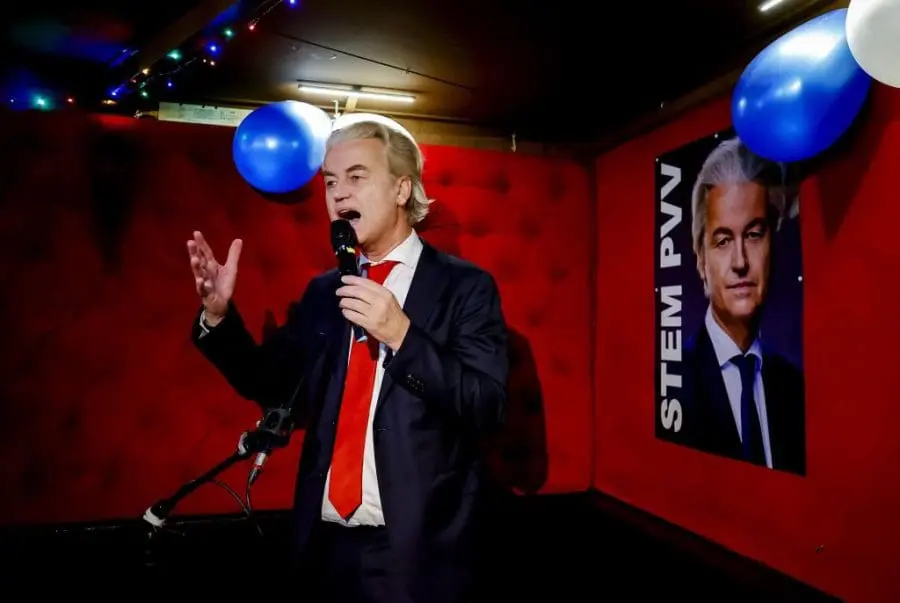Politics
Dutch Far-Right Leader Geert Wilders’ Election Victory Was Long in the Making

The Shocking Rise of Geert Wilders
The recent victory of Dutch far-right leader Geert Wilders in the country's elections may have come as a surprise to many, but his rise to power was actually a long time coming. For years, mainstream conservatives have adopted his talking points, and now, they may have inadvertently paved the way for him to become the next prime minister.
The Political Landscape Shift
The Dutch elections sent shockwaves across Europe, with Wilders' far-right Party for Freedom (PVV) emerging as the largest party in the Netherlands. This marks an unprecedented victory for a far-right party in Dutch postwar history. While many express disbelief and outrage, the truth is that Wilders' success is a result of the further radicalization of the right.
The Role of Migration
The politicization of migration played a crucial role in Wilders' rise to power. While issues such as the "cost of living" crisis and democratic accountability were prominent in this election, it was the focus on migration that ultimately decided the outcome. The collapse of the previous government over this issue brought migration back to the forefront, and Wilders capitalized on it by using the slogan "Dutch people first."
The Role of Mainstream Conservatives
The liberal-conservative People's Party for Freedom and Democracy (VVD), led by outgoing prime minister Mark Rutte, played a dangerous game with its messaging around migration. By adopting language and policies similar to those of the far right, the VVD inadvertently helped normalize their ideas. This shift towards the right ultimately backfired, as the VVD suffered heavy losses in the election.
The Rise of Geert Wilders
Geert Wilders first gained traction in 2006 when he won nine seats in the elections and renamed his party the Party for Freedom. He built his party on a platform that called for the dominance of the Judeo-Christian and humanist tradition and culture, while also advocating for the scrapping of the ban on discrimination in the Dutch constitution. Since then, Wilders has been a prominent figure in Dutch politics, known for his controversial views on Islam and immigration.
The Shift in the VVD
The VVD, under the leadership of Mark Rutte, played a significant role in the normalization of the far right. In an attempt to compete with the PVV, the VVD embraced anti-immigration rhetoric and policies, renouncing its own classical-liberal values. Rutte's focus on the "refugee crisis" and his actions on the European stage helped create a climate that favored the far right.
A Political Framing
The debate around migration and social security in the Netherlands has been framed in a way that benefits the far right. While the number of asylum applications has remained relatively stable, the right-wing narrative portrays the country as "one big asylum seekers' center." This framing is misleading and ignores the economic benefits that migration brings to the country.
The Base of Geert Wilders' Support
Geert Wilders' party attracted voters from various backgrounds and regions of the Netherlands. Many who voted for him did so out of dissatisfaction with the establishment parties. While some may argue that Wilders has become "milder" in his rhetoric, his program remains essentially discriminatory and racist.
The Future of Dutch Politics
The outcome of the election has left the creation of the next Dutch government in a complicated situation. A coalition of the PVV with the VVD and the Christian-democratic New Social Contract (NSC) is possible, as is an anti-Wilders cabinet of the VVD, NSC, and the center-left alliance under Frans Timmermans (PvdA-Green Left). The resistance to Wilders among the VVD and NSC seems to have weakened, indicating a potential shift in their stance.
Overall, the rise of Geert Wilders and the far right in the Netherlands is part of a broader normalization of far-right politics in Europe. The left now faces a new challenge and must find a way to be more combative in order to counter this threat.
Hello there! I’m Jeremy Ramirez, your go-to guy for all things content marketing and social media at NewsScroller. Currently residing in the vibrant city of Omaha, NE, I’m living my dream of combining my passion for journalism with the dynamic world of digital media.
I’m a proud graduate of the University of Nebraska, where I honed my skills and earned a degree in journalism. My college days were filled with endless learning, coffee-fueled study sessions, and the excitement of discovering the power of storytelling.
Post-graduation, I found my calling at NewsScroller, where I currently lead a team of creative minds in shaping compelling content strategies. Every day is a new adventure here – crafting stories, analyzing trends, and engaging with our vibrant online community.
When I’m not immersed in the digital world, you’ll find me cherishing moments with my amazing wife and our two energetic boys. Our family is completed by Dagwood, our adorable Pug, who always brings smiles to our faces.
Traveling is my escape and inspiration. I love exploring new cultures, tasting local cuisines, and capturing memories through my lens. As a speaker at social media events, I enjoy sharing insights and learning from fellow enthusiasts.
Curious about content marketing strategies or the latest social media trends? Or maybe you want to exchange travel stories? Feel free to reach out. I’m always up for a chat and eager to connect with like-minded individuals. Let’s navigate the exciting world of digital media together!
Want to know more or say hi? Drop me a message anytime!